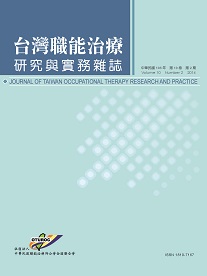Journal of Taiwan Occupational Therapy Research and Practice

半年刊,正常發行
目的:探討職能與物理治療師在健保總額預算支付制度(簡稱總額)實施期間的工作感受、工作壓力源感受及兩者的影響因素。方法:在桃園地區採分層比例抽樣獲得樣本。使用已具信效度的醫療工作的壓力源感受量表(QMWS)、健保總額預算前後工作感受改變量表(WPGB)。邀請被抽中之職能與物理治療師填寫問卷。結果:2006年7-12月得有效問卷97份(29位職能治療師、68位物理治療師)。職能與物理治療師的QMWS總分為32.077.35,百分位為66.8;QMWS前三項為面對醫療糾紛、薪水的給付制度、應付醫院評鑑工作。WPGB總分為31.23 3.48,百分位為69.4;WPGB前三項為薪水、工作量、醫療品質。對薪水不滿意、非常不滿意者高達50.5%。有離職打算者(含有時會、經常會、幾乎總是)高達50.4%。薪水滿意度與離職打算有顯著負相關( = -.38)。婚姻狀況、WPGB及工作類型是QMWS的顯著影響因素。職等、薪水滿意度、離職打算是WPGB的顯著影響因素。結論:健保總額期間,職能與物理治療師對總額前後工作感受改變有負向感受、對薪水不滿意、工作壓力增加,影響職能與物理治療師的工作意願。
Objective: To investigate stress at work and work perceptions among occupational and physical therapists during the implementation of the global budget payment system of the National Health Insurance. Factors affecting stress and work perceptions were examined. Methods: A cross-sectional study with a stratified and proportional random sampling in Taoyuan was used to obtain the sample. Two questionnaires with acceptable reliability and validity were used. One questionnaire measured the change of work perceptions before and after the global budget for medical employees (WPGB) and the other questionnaire measured medical workers stress (QMWS). Sampled therapists were invited to participate and fill out the questionnaires. Results: From July to December 2006, 97 valid questionnaires were obtained (29 occupational therapists, 68 physical therapists). The total score of the QMWS was 32.07 7.35, and the percentile was 66.8. The first three items of QMWS were how they face medical disputes, receive pay (salary), and prepare work for hospital accreditation. The total score of the WPGB was 31.23 3.48, with a percentile of 69.4. The first three items of WPGB were salary, workload, and treatment quality. Dissatisfaction with their salaries was as high as 50.5%. The intention to quit (sometimes, often, always) was 50.4%. The salary satisfaction and intent to quit was negative correlated (= -.38, < .001). Marital status, WPGB and work type were the significant factors of QMWS. Work position, salary satisfaction and intent to quit were significant factors of WPGB. Conclusion: During the implementation of the global budget payment system, occupational and physical therapists had adverse work perceptions, were dissatisfied with their pay, felt increased stress, and had high intention to quit their jobs.












